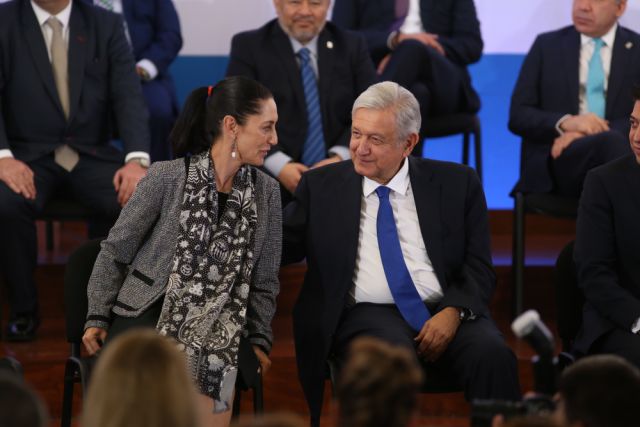
Claudia Sheinbaum, the governor of Mexico City, and Mexico’s current President Andrés Manuel López Obrador. (Source: Shutterstock)
While Claudia Sheinbaum, Mexico’s leading presidential candidate, is likely to win the June 2 presidential election, she will not turn Mexico away from importing piped gas from the U.S., according to BMI, a Fitch Solutions company.
“Although Sheinbaum indicated she would facilitate higher domestic gas production [to ensure gas independence], we expect Mexico to continue relying on imports from the U.S.,” BMI Senior Oil and Gas Analyst Dominika Rzechorzek said during a May 22 webinar that previewed Mexico’s upcoming elections.
Despite the potential upside related to higher gas production in Mexico under a Sheinbaum presidency—a slight divergence from the policy under Mexico’s current President Andrés Manuel López Obrador (AMLO)—Rzechorzek downplayed that possibility. The ongoing financial and operational headwinds that confront state-owned Petroleos Mexicanos (Pemex) are likely to hamper such efforts.
RELATED
Pemex to Remain Fiscally Challenged for Mexico’s Next President
“This upside remains relatively small just because of Pemex’s relatively poor track record of developing gas only projects, the continued abundance of supply from the U.S., existing cross border capacity between the U.S. and Mexico and production costs at Pemex compared to U.S.,” Rzechorzek said.
Gas-hungry Mexico imported an average of 6.8 Bcf/d of gas from the U.S. during the week ended May 15, according to data from the U.S. Energy Information Administration (EIA).
And while Sheinbaum favors an accelerated energy transition and a boost in gas production, she is expected to continue with many of the policies of her MORENA Party colleague.
“In our view, Sheinbaum will most likely continue AMLO’s policies in facilitating investment in export infrastructure. However, we highlight lingering challenges, primarily [a] lack of midstream and road infrastructure which could delay some of the projects in pre-FID stage,” Rzechorzek said.
Rzechorzek said BMI expects Mexico to become a net exporter of LNG in 2024 and still start LNG exports from facilities under construction in line with the agency’s current forecast.
A number of export infrastructure developers, especially on Mexico’s Pacific Coast, are betting big on LNG exports. If projects proposed by Sempra Infrastructure, Mexico Pacific and LNG Alliance Pte Ltd. Singapore move forward, they will help Mexico bring to market approximately 59 million tonnes per annum (mtpa) of liquefaction capacity, or around 7.8 Bcf/d, according to data compiled by Hart Energy.
RELATED
Permian Gas Finds Another Way to Asia
Policy continuity under Sheinbaum
BMI Associate Director Conor Beakey said a Sheinbaum victory this summer would result in “policy continuity.”
Beakey said Sheinbaum’s more technocratic approach to policymaking would likely result in an improvement in the business operations environment in Mexico. Beakey said he expected Sheinbaum to continue with Mexico’s isolationist stance under AMLO.
“While a close ally of AMLO, we expect Sheinbaum to pursue a more technocratic approach to policy making,” Beakey said. “The 'rules of the game' should become clearer and decisions better signposted.”
Beakey said Mexico’s bilateral relations with the U.S. would hinge on the Nov. 8 presidential election.
“AMLO managed to avoid conflict with [former U.S. President Donald] Trump and [U.S. President Joe] Biden—the former through appeasement and the latter through circumstance,” Beakey said.
Beakey said BMI expected Mexico's industrial policy to become more formalized, with an emphasis on semiconductors, electronics, electric vehicles, medical devices and agribusiness, sectors identified as key targets for near-shoring tax breaks.
Recommended Reading
Paisie: Impact of Tariffs, Sanctions and ‘Drill, Baby, Drill’
2025-03-07 - The U.S. has the advantage with tariffs on Canada, but sanctions and pleas for increased oil supply are unlikely to be effective.
Impacts of Trump’s Tariffs on North American Energy Markets
2025-03-06 - On March 6, President Trump granted exemptions on tariffs for numerous goods imported from Mexico and Canada until April 2, when Trump intends to impose another set of retaliatory tariffs on various countries. What are their immediate and long-term impacts and how can companies mitigate their effects?
Trade War! Or Maybe Not
2025-03-06 - An energy industry that prefers stability gets hit with whiplash as it attempts to adjust to the Great Disruptor taking over the White House.
Mexico Won't Have to Pay Tariffs on USMCA Goods Until April 2, Trump Says
2025-03-06 - President Trump paused tariffs on Mexico—again—this time for one month.
DOE Approves Non-FTA Permit Extension for Golden Pass LNG
2025-03-05 - Golden Pass LNG will become the ninth U.S. LNG export facility following the U.S. Department of Energy’s approval for an extension of its non-free trade agreement permit.
Comments
Add new comment
This conversation is moderated according to Hart Energy community rules. Please read the rules before joining the discussion. If you’re experiencing any technical problems, please contact our customer care team.





